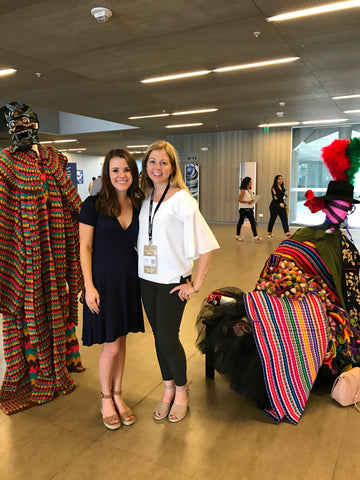Across the Borderline - Baton Rouge Business Report
How One Baton Rouge Retailer Went Straight to the Source to Secure Artisan Goods Abroad
By Maggie Heyn Richardson
Originally published in Baton Rouge Business Report
 For interior designer, Colleen Waguespack, the Christmas season has long presented an odd challenge.
For interior designer, Colleen Waguespack, the Christmas season has long presented an odd challenge.
Clients in Baton Rouge and New Orleans who hired Waguespack to create high end looks throughout the year routinely asked for help in also upgrading their Christmas decorations. The old school greens, reds and metallics they pulled down from the attic clashed against Waguespack’s signature muted, restrained style.
“Christmas decorating wasn’t something we did for clients, and frankly, it’s not something I ever had much interest in,” Waguespack says. “But when you saw how inconsistent their decorations were with the work we’d just done, I thought, maybe there’s a real opportunity here.”
Waguespack got to work. A 20-year industry veteran, Waguespack began branding a new line of couture Christmas decorations using luxury fabrics and original designs created by established artists. She named the venture Fig & Dove, an online store that features limited run and permanent collections of Christmas stockings, tree skirts, ornaments and tree-toppers. It quickly earned praise and, last fall, was featured in southern lifestyle magazine, Garden & Gun.
Some items are set off in elegant neutrals and are intended to mirror the kind of high end draperies and throw pillows that Waguespack routinely places in her clients’ homes. They’re also meant to stand out for their workmanship. A hand painted white velvet stocking from Fig & Dove’s Coleman Taylor Collection sells for $350. Louisiana artist Brad Bourgoyne’s special collection of handmade dove ornaments start at $40 each. Tree skirts in Fortuny fabric sell for more than $1,000.

Waguespack’s goal was to create a line that families would want to collect and hand down as heirlooms. The permanent collection features recurring items, while new artisan collections are introduced annually.
Fig & Dove’s 2017 artisan collection is based in alpaca, the soft, indulgent wool that’s become the darling of the design world. But if Waguespack was going to work with alpaca, she knew she needed to learn something about working in Peru, the world’s leading supplier of alpaca. Moreover, she knew that costs could run amok if she didn’t guard the sourcing and production process carefully.
“There are a million great ideas out there,” she says, “but if you don’t drill down the financial side first, there’s no point.”
To source her 2017 artisan collection, Waguespack and Cate Brooks, who handles product development for Fig & Dove, traveled to Peru. Here are Waguespack’s five tips for sourcing artisan goods abroad:
-
Go to the source.
When Waguespack formed her company, an experienced e-commerce mentor told her that success in an online store rested on two factors: Stocking the site with excellent photography and working with solid sourcers to find the best product or raw material from the right location around the globe for the right price. Sourcers are industry insider who can help establish a pipeline for materials or finished goods from overseas craftsmen or manufacturers to domestic businesses. “A good sourcer can identify the part of the world you need to be looking in, and make sure you can work with factories there that are reputable,” says Waguespack.
-
Get the government involved. No, really.
While researching how to do business in Peru, Waguespack discovered through her professional networks that the Peruvian government hosts an annual conference called Peru Moda which connects artisans in Peru with worldwide fashion and design manufacturers. It was exactly the kind of roundup of artisans and alpaca sources that Waguespack was looking for. She and a Fig & Dove employee submitted an application right away to attend. The duo not only had access to established sources who were comfortable doing business with U.S. companies; they also got a big break on the price of travel when Peru Moda underwrote a large percentage of Fig & Dove’s travel costs.
-
A picture’s worth a thousand…
Waguespack learned the hard way that shipping prototypes of finished products isn’t the way to go. After sourcing the alpaca wool in Peru and also identifying a solid manufacturer to make stockings and tree skirts, Waguespack paid a hefty sum for samples to be shipped for her approval. It turned out to be a waste of time and money. The items had numerous mistakes that needed correcting, which Waguespack could have been spotted in detailed photographs. “After a few times, I said, no more. We’re never going to make product if we don’t control the inefficiencies,” says Waguespack. “Get photos of everything before shipments are made so you know what you’re getting.”
-
Expand your networks.
All fledgling businesses need to network, but women-owned ventures can benefit from this in particular. “Women-owned businesses fail at a really high rate, and we need a network around the U.S. of similar businesses, so the learning curve won’t be so large,” says Waguespack, who has become heavily involved in the national Circular Board, a business accelerator for growth-oriented women business owners. “I constantly pick up the phone and ask someone I know for help or advice on how to do things,” Waguespack says.
-
Get eyeball to eyeball.
Personally meeting the vendors and suppliers she ended up doing business with was an essential part of the process, Waguespack says. She spend several days in Lima, and while there, settled on which companies she wanted to work with. Face-to-face meetings allowed her to explain her company’s brand, communicate in detail how she wanted each item produced and learn more about the production process. “The digital world we live in today is incredible for communication and business,” she says, “but nothing can replace a face-to-face meeting when developing a relationship.”













